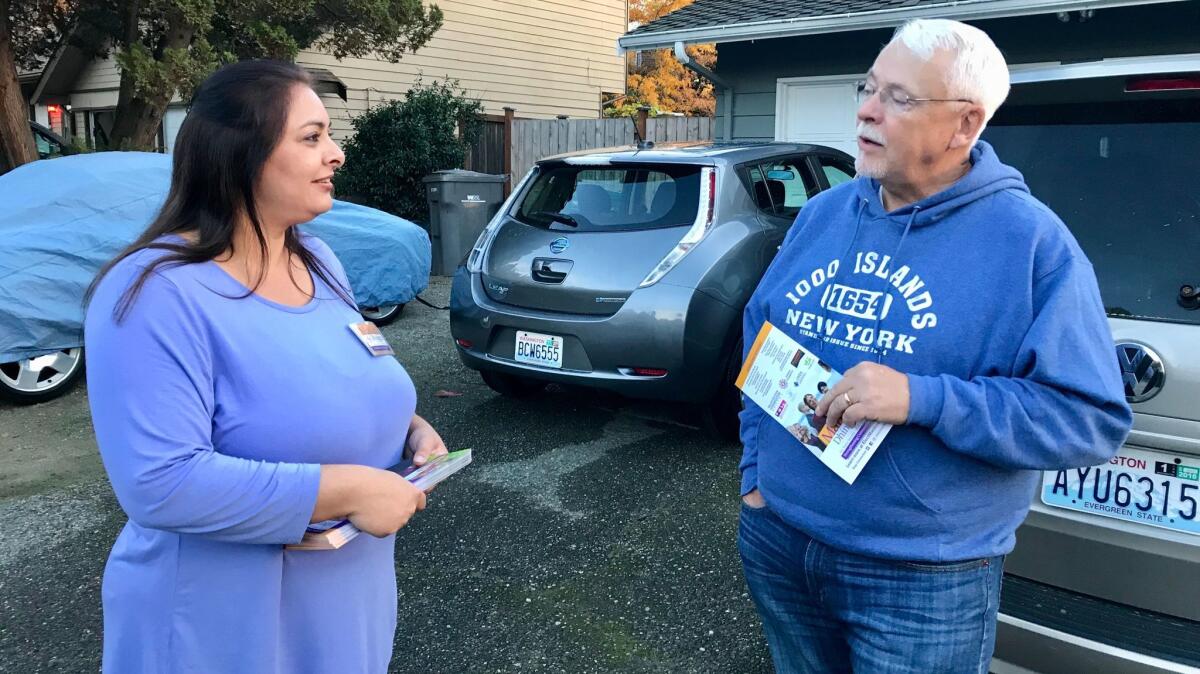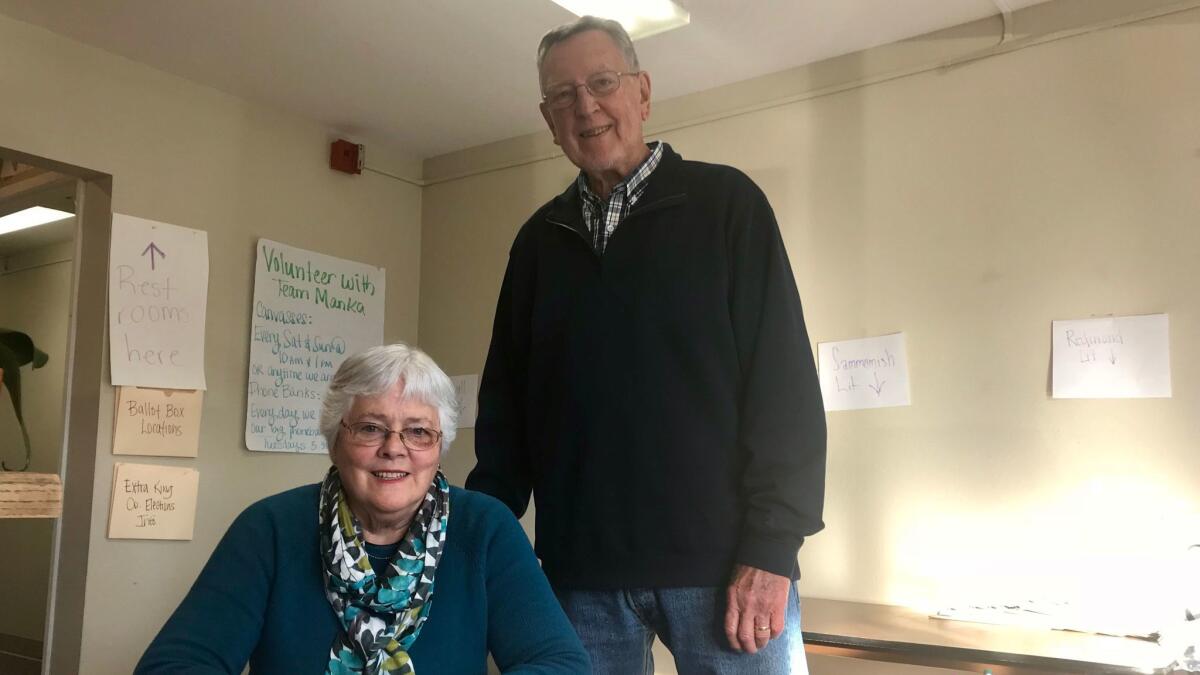With Washington statehouse at stake, Democrats seek to build a West Coast wall of Trump resistance
Reporting from Redmond, Wash. — One year ago, Manka Dhingra was preparing for a celebration, a gathering of family and friends to mark Hillary Clinton’s election as the nation’s first woman president.
Today, she is bearing the hopes and dreams of Democrats crushed by Clinton’s loss and trying to help the party pull itself from a deep hole.
A state Senate race pitting two campaign novices in the upscale suburbs east of Seattle has turned into a major battle between the two national parties, becoming the costliest legislative contest in state history and serving as a test of the Trump effect far from the other Washington.
At stake is control of the state Capitol in Olympia. Democrats, who run the governments in California and Oregon, hope to build a blue wall of resistance the length of the West Coast and get a shot of momentum ahead of 2018 by extending their legislative winning streak under Trump.
The election Tuesday “is an awakening” for activists “who might otherwise feel powerless about what’s going on in D.C.,” said Tina Podlodowski, head of the state Democratic Party. “We can elect great people around the country who can stop the worst of the Trump agenda.”
For Republicans, the contest is a fight to preserve their toehold in Olympia, to stop the worst excesses of Democratic rule and elect an exuberant millennial, Jinyoung Englund, whose family history — she is the child of Korean immigrants — and background reflect the changes remaking this thriving high-tech hub, a home to Microsoft, T-Mobile and SpaceX among others.
As for Trump, Englund and her supporters insist the race has everything to do with local personalities and issues and nothing whatever to do with the president or his policies. “It’s not an issue of Republican vs. Democrat,” Englund said. “It’s an issue of one-party control and what does that mean.”
For residents, concerns include education funding — the schools are among the best in the state — and the hellish traffic that spills off backed-up freeways, sending cars snaking bumper-to-bumper through their hilly neighborhoods.
For the rest of the state, issues such as taxes, healthcare, climate change and voting rights all hinge on control of the Senate, where Republicans — clinging to a single-vote majority — have served as a check on Democratic Gov. Jay Inslee and Democrats running the House. Tuesday’s election is to fill a seat vacated when a Republican senator died in office, leaving the chamber evenly split.
“If you have one-party rule… you can see what happens in Seattle,” said Susan Hutchison, the state GOP chair, using Republican shorthand depicting the city as a slough of drugs, homelessness and wacky liberalism. “It’s dangerous.”
Still, despite those overtones, Trump’s presence looms as surely as the rain clouds hanging over this wet corner of the country.
Dhingra, 42, probably wouldn’t be a candidate if Trump hadn’t been elected. “I love my job,” said the veteran King County prosecutor and mother of two teens. “I love working with nonprofits. I love being involved with my kids in school.”

Dixie Swenson, 78, wouldn’t be among the legion of campaign volunteers along with her 81-year-old husband, Keith, if the pugnacious president hadn’t driven the two of them a little batty. “We spent a few weeks yelling at the TV and found that didn’t do any good,” Swenson said cheerily. “So we found a way to get involved.”
And the race might not have drawn national attention from the likes of former Vice President Joe Biden, who recently endorsed Dhingra, and record-shattering millions — $8.5 million and counting — had Democrats not been desperate to reverse their fortunes after the political devastation of the last eight years.
Under President Obama, Democrats lost more than 1,000 legislative seats nationwide, leaving the party at its lowest standing in statehouses since 1920, according to the National Conference of State Legislatures.
“For a long time, Democrats across the country had a philosophy of elect a president and a majority in the Senate and it all trickles down,” said Jessica Post, who heads the party’s legislative campaign committee.
Now Democrats are looking to rebuild from the ground up, she said, to groom candidates for higher office, construct a state-level bulwark against Trump’s policies and position Democrats for a greater say when legislative and congressional districts are redrawn after the 2020 census.
The result so far: Democrats have flipped eight state legislative seats since Trump took office, including GOP-leaning districts in Oklahoma and New Hampshire. While that’s a fractional sample size — there are more than 7,000 legislative seats nationwide — Republicans acknowledge the stiffer competition.
“They are energized, mobilized and sending resources across the country in a way they have not in the past,” said Matt Walter, head of the GOP’s legislative campaign effort. “That is very, very real.”
For a long time, Democrats across the country had a philosophy of elect a president and a majority in the Senate and it all trickles down.
— Jessica Post, executive director, Democratic Legislative Campaign Committee
All that national attention has had a somewhat perverse effect here in Washington, as though the contest has been hijacked from the candidates themselves. Advertising by outside interests offer a caricature of the two: Dhingra as a left-wing radical, Englund as a lockstep Trump loyalist.
Neither is true.
Dhingra, who moved to the U.S. with her family from India when she was 13, has spent nearly 20 years working as a prosecuting attorney and running a nonprofit organization that works to reduce violence in the growing Asian American community. A longtime activist in Redmond, she attended her first party gathering just last December.
“I spent the last 20 years of my life being completely nonpartisan,” she said. “A problem-solver.”
Englund, 33, has worked as an aide to a Republican congressman, a spokeswoman for bitcoin, the digital currency, and helped develop a mobile phone app used by Marines to acclimate abroad; her husband serves on active duty in Okinawa.
Raised in Tacoma, she moved to Woodinville, in the region’s wine country, not long before launching her candidacy. She’s introduced herself to voters by ringing an estimated 17,000 doorbells, pacing off 1.5 million steps, according to her fitness app, and wearing out three pairs of shoes.
Like Dhingra, she shuns overt partisanship.
“I grew up apolitical,” said Englund, who wrote in a third-party candidate for president last November rather than support Trump or Clinton.
Neither candidate makes much of party labels — you have to practically squint to find a “D” or “R” on their campaign literature — which makes tactical sense in an area filled with highly educated voters who pride themselves on political discernment.
“They want candidates who speak for themselves,” said Maria Leininger, a professor at Bellevue College who has run Democratic campaigns in the district, “and not knee-jerk partisans.”

But that doesn’t lessen the import for the two political parties, or make Democratic activists any less motivated to send a message to Trump by snatching a seat the GOP has held for years.
“Absolutely,” said Dixie Swenson, who works the sign-in desk at Dhingra’s Redmond headquarters. A win Tuesday would be “a victory for the people who lost the last time.”
More to Read
Sign up for Essential California
The most important California stories and recommendations in your inbox every morning.
You may occasionally receive promotional content from the Los Angeles Times.











